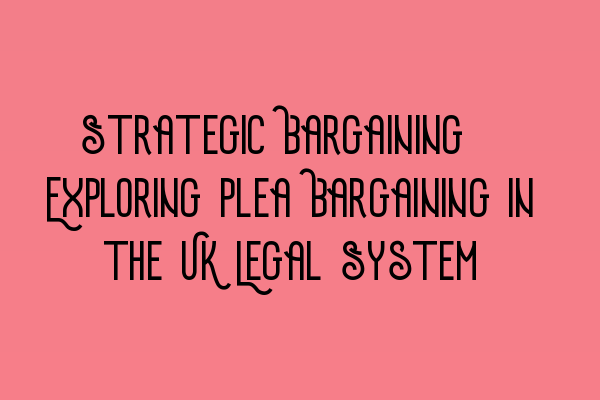Strategic Bargaining: Exploring Plea Bargaining in the UK Legal System
Welcome to the blog of SQE Criminal Law & Practice Law UK! In this post, we will delve into a fascinating aspect of criminal law – strategic bargaining and plea bargaining in the UK legal system. Plea bargaining has gained significant attention over the years, and it plays a crucial role in the criminal justice process.
Understanding Plea Bargaining
Plea bargaining refers to the negotiation process between the prosecution and the defense, where the defendant agrees to plead guilty in exchange for certain concessions from the prosecution. These concessions may include reduced charges, a lighter sentence, or the dismissal of certain charges altogether.
It’s essential to highlight that plea bargaining is not a formal process regulated by legislation in the UK. Instead, it has evolved as a practice within the criminal justice system. While not all cases involve plea bargaining, it is a widely accepted and utilized strategy by defense lawyers and prosecutors to expedite the resolution of cases.
The Benefits of Plea Bargaining
Plea bargaining offers several advantages to both the prosecution and defense. For the prosecution, it helps in streamlining the criminal justice system by avoiding lengthy trials and reducing the burden on the courts. It enables the allocation of resources to more complex cases, leading to a more efficient judicial process.
On the other hand, defendants often benefit from plea bargaining by receiving reduced sentences. In cases where the evidence against them is substantial, accepting a plea deal can result in a lighter punishment compared to the potential outcome of a trial. Plea bargaining can also provide defendants with the opportunity to avoid the uncertainty and stress of a trial.
Factors Influencing Plea Bargaining
Several factors come into play during the plea bargaining process. The strength of the evidence, the gravity of the offense, the defendant’s criminal history, and the public interest in the case are all crucial considerations. Additionally, the resources available to the prosecution and the defense, as well as the efficiency of the court system, can impact the plea bargaining strategy.
It’s important to note that while plea bargaining can provide benefits to both parties involved, it is not without its criticisms. Some argue that innocent defendants may be coerced into accepting plea deals for fear of harsher penalties if they proceed to trial. Others contend that plea bargaining can lead to disparities in sentencing and diminish the transparency and integrity of the criminal justice system.
The Role of Defense Lawyers
Defense lawyers play a vital role in the plea bargaining process. Their expertise and negotiation skills are crucial in securing favorable outcomes for their clients. It is imperative for defense lawyers to thoroughly assess the evidence, evaluate the strength of the prosecution’s case, and advise their clients on the pros and cons of accepting a plea deal.
At SQE Criminal Law & Practice Law UK, we understand the complexities involved in plea bargaining and the importance of strategic negotiation. Our team of experienced defense attorneys is well-versed in UK criminal law and dedicated to advocating for their clients’ interests.
If you’re interested in exploring SQE 1 and SQE 2 preparation courses or want to stay updated on the SRA SQE exam dates, feel free to check out our related articles:
- SQE 1 Practice Exam Questions
- SQE 1 Practice Mocks FLK1 FLK2
- SQE 2 Preparation Courses
- SQE 1 Preparation Courses
- SRA SQE Exam Dates
Stay tuned for more informative and thought-provoking articles from the knowledgeable experts at SQE Criminal Law & Practice Law UK!
